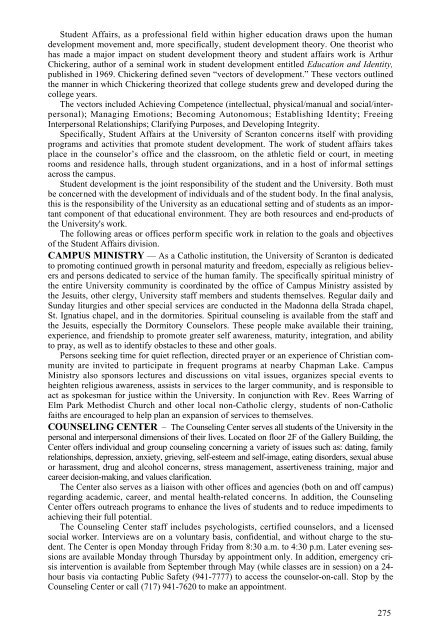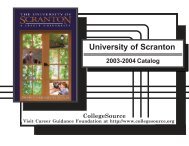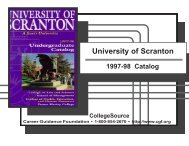You also want an ePaper? Increase the reach of your titles
YUMPU automatically turns print PDFs into web optimized ePapers that Google loves.
Student Affairs, as a pr<strong>of</strong>essional field within higher education draws upon the human<br />
development movement and, more specifically, student development theory. One theorist who<br />
has made a major impact on student development theory and student affairs work is Arthur<br />
Chickering, author <strong>of</strong> a seminal work in student development entitled Education and Identity,<br />
published in 1969. Chickering defined seven “vectors <strong>of</strong> development.” <strong>The</strong>se vectors outlined<br />
the manner in which Chickering theorized that college students grew and developed during the<br />
college years.<br />
<strong>The</strong> vectors included Achieving Competence (intellectual, physical/manual and social/interpersonal);<br />
Managing Emotions; Becoming Autonomous; Establishing Identity; Freeing<br />
Interpersonal Relationships; Clarifying Purposes, and Developing Integrity.<br />
Specifically, Student Affairs at the <strong>University</strong> <strong>of</strong> <strong>Scranton</strong> concerns itself with providing<br />
programs and activities that promote student development. <strong>The</strong> work <strong>of</strong> student affairs takes<br />
place in the counselor’s <strong>of</strong>fice and the classroom, on the athletic field or court, in meeting<br />
rooms and residence halls, through student organizations, and in a host <strong>of</strong> informal settings<br />
across the campus.<br />
Student development is the joint responsibility <strong>of</strong> the student and the <strong>University</strong>. Both must<br />
be concerned with the development <strong>of</strong> individuals and <strong>of</strong> the student body. In the final analysis,<br />
this is the responsibility <strong>of</strong> the <strong>University</strong> as an educational setting and <strong>of</strong> students as an important<br />
component <strong>of</strong> that educational environment. <strong>The</strong>y are both resources and end-products <strong>of</strong><br />
the <strong>University</strong>'s work.<br />
<strong>The</strong> following areas or <strong>of</strong>fices perform specific work in relation to the goals and objectives<br />
<strong>of</strong> the Student Affairs division.<br />
CAMPUS MINISTRY — As a Catholic institution, the <strong>University</strong> <strong>of</strong> <strong>Scranton</strong> is dedicated<br />
to promoting continued growth in personal maturity and freedom, especially as religious believers<br />
and persons dedicated to service <strong>of</strong> the human family. <strong>The</strong> specifically spiritual ministry <strong>of</strong><br />
the entire <strong>University</strong> community is coordinated by the <strong>of</strong>fice <strong>of</strong> Campus Ministry assisted by<br />
the Jesuits, other clergy, <strong>University</strong> staff members and students themselves. Regular daily and<br />
Sunday liturgies and other special services are conducted in the Madonna della Strada chapel,<br />
St. Ignatius chapel, and in the dormitories. Spiritual counseling is available from the staff and<br />
the Jesuits, especially the Dormitory Counselors. <strong>The</strong>se people make available their training,<br />
experience, and friendship to promote greater self awareness, maturity, integration, and ability<br />
to pray, as well as to identify obstacles to these and other goals.<br />
Persons seeking time for quiet reflection, directed prayer or an experience <strong>of</strong> Christian community<br />
are invited to participate in frequent programs at nearby Chapman Lake. Campus<br />
Ministry also sponsors lectures and discussions on vital issues, organizes special events to<br />
heighten religious awareness, assists in services to the larger community, and is responsible to<br />
act as spokesman for justice within the <strong>University</strong>. In conjunction with Rev. Rees Warring <strong>of</strong><br />
Elm Park Methodist Church and other local non-Catholic clergy, students <strong>of</strong> non-Catholic<br />
faiths are encouraged to help plan an expansion <strong>of</strong> services to themselves.<br />
COUNSELING CENTER – <strong>The</strong> Counseling Center serves all students <strong>of</strong> the <strong>University</strong> in the<br />
personal and interpersonal dimensions <strong>of</strong> their lives. Located on floor 2F <strong>of</strong> the Gallery Building, the<br />
Center <strong>of</strong>fers individual and group counseling concerning a variety <strong>of</strong> issues such as: dating, family<br />
relationships, depression, anxiety, grieving, self-esteem and self-image, eating disorders, sexual abuse<br />
or harassment, drug and alcohol concerns, stress management, assertiveness training, major and<br />
career decision-making, and values clarification.<br />
<strong>The</strong> Center also serves as a liaison with other <strong>of</strong>fices and agencies (both on and <strong>of</strong>f campus)<br />
regarding academic, career, and mental health-related concerns. In addition, the Counseling<br />
Center <strong>of</strong>fers outreach programs to enhance the lives <strong>of</strong> students and to reduce impediments to<br />
achieving their full potential.<br />
<strong>The</strong> Counseling Center staff includes psychologists, certified counselors, and a licensed<br />
social worker. Interviews are on a voluntary basis, confidential, and without charge to the student.<br />
<strong>The</strong> Center is open Monday through Friday from 8:30 a.m. to 4:30 p.m. Later evening sessions<br />
are available Monday through Thursday by appointment only. In addition, emergency crisis<br />
intervention is available from September through May (while classes are in session) on a 24hour<br />
basis via contacting Public Safety (941-7777) to access the counselor-on-call. Stop by the<br />
Counseling Center or call (717) 941-7620 to make an appointment.<br />
275
















